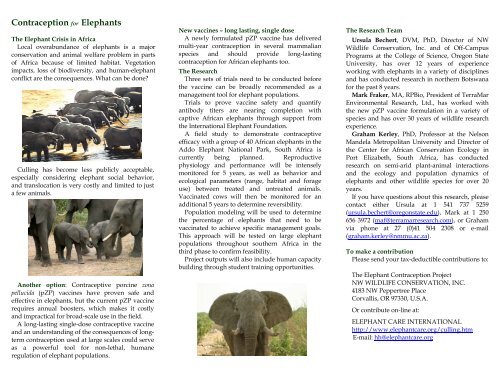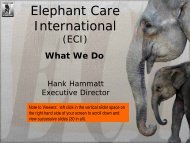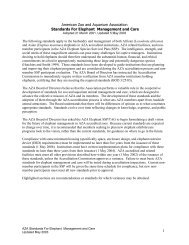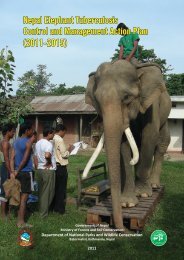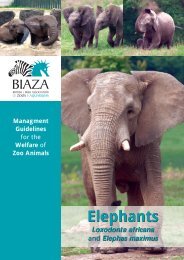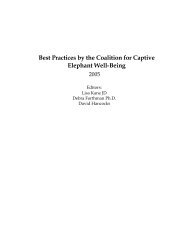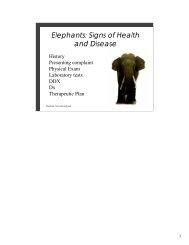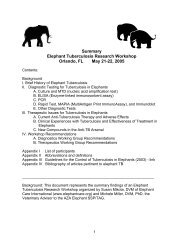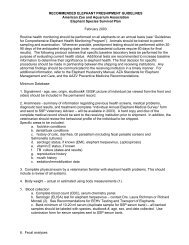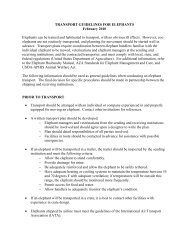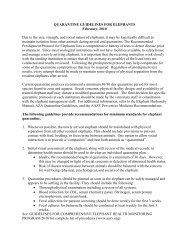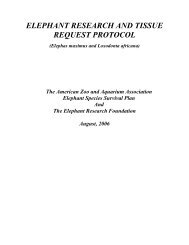new brochure - Elephant Care International
new brochure - Elephant Care International
new brochure - Elephant Care International
Create successful ePaper yourself
Turn your PDF publications into a flip-book with our unique Google optimized e-Paper software.
Contraception for <strong>Elephant</strong>s<br />
The <strong>Elephant</strong> Crisis in Africa<br />
Local overabundance of elephants is a major<br />
conservation and animal welfare problem in parts<br />
of Africa because of limited habitat. Vegetation<br />
impacts, loss of biodiversity, and human-elephant<br />
conflict are the consequences. What can be done?<br />
Culling has become less publicly acceptable,<br />
especially considering elephant social behavior,<br />
and translocation is very costly and limited to just<br />
a few animals.<br />
Another option: Contraceptive porcine zona<br />
pellucida (pZP) vaccines have proven safe and<br />
effective in elephants, but the current pZP vaccine<br />
requires annual boosters, which makes it costly<br />
and impractical for broad-scale use in the field.<br />
A long-lasting single-dose contraceptive vaccine<br />
and an understanding of the consequences of longterm<br />
contraception used at large scales could serve<br />
as a powerful tool for non-lethal, humane<br />
regulation of elephant populations.<br />
New vaccines – long lasting, single dose<br />
A <strong>new</strong>ly formulated pZP vaccine has delivered<br />
multi-year contraception in several mammalian<br />
species and should provide long-lasting<br />
contraception for African elephants too.<br />
The Research<br />
Three sets of trials need to be conducted before<br />
the vaccine can be broadly recommended as a<br />
management tool for elephant populations.<br />
Trials to prove vaccine safety and quantify<br />
antibody titers are nearing completion with<br />
captive African elephants through support from<br />
the <strong>International</strong> <strong>Elephant</strong> Foundation.<br />
A field study to demonstrate contraceptive<br />
efficacy with a group of 40 African elephants in the<br />
Addo <strong>Elephant</strong> National Park, South Africa is<br />
currently being planned. Reproductive<br />
physiology and performance will be intensely<br />
monitored for 5 years, as well as behavior and<br />
ecological parameters (range, habitat and forage<br />
use) between treated and untreated animals.<br />
Vaccinated cows will then be monitored for an<br />
additional 5 years to determine reversibility.<br />
Population modeling will be used to determine<br />
the percentage of elephants that need to be<br />
vaccinated to achieve specific management goals.<br />
This approach will be tested on large elephant<br />
populations throughout southern Africa in the<br />
third phase to confirm feasibility.<br />
Project outputs will also include human capacity<br />
building through student training opportunities.<br />
The Research Team<br />
Ursula Bechert, DVM, PhD, Director of NW<br />
Wildlife Conservation, Inc. and of Off-Campus<br />
Programs at the College of Science, Oregon State<br />
University, has over 12 years of experience<br />
working with elephants in a variety of disciplines<br />
and has conducted research in northern Botswana<br />
for the past 8 years.<br />
Mark Fraker, MA, RPBio, President of TerraMar<br />
Environmental Research, Ltd., has worked with<br />
the <strong>new</strong> pZP vaccine formulation in a variety of<br />
species and has over 30 years of wildlife research<br />
experience.<br />
Graham Kerley, PhD, Professor at the Nelson<br />
Mandela Metropolitan University and Director of<br />
the Center for African Conservation Ecology in<br />
Port Elizabeth, South Africa, has conducted<br />
research on semi-arid plant-animal interactions<br />
and the ecology and population dynamics of<br />
elephants and other wildlife species for over 20<br />
years.<br />
If you have questions about this research, please<br />
contact either Ursula at 1 541 737 5259<br />
(ursula.bechert@oregonstate.edu), Mark at 1 250<br />
656 3972 (maf@terramarresearch.com), or Graham<br />
via phone at 27 (0)41 504 2308 or e-mail<br />
(graham.kerley@nmmu.ac.za).<br />
To make a contribution<br />
Please send your tax-deductible contributions to:<br />
The <strong>Elephant</strong> Contraception Project<br />
NW WILDLIFE CONSERVATION, INC.<br />
4183 NW Peppertree Place<br />
Corvallis, OR 97330, U.S.A.<br />
Or contribute on-line at:<br />
ELEPHANT CARE INTERNATIONAL<br />
http://www.elephantcare.org/culling.htm<br />
E-mail: hh@elephantcare.org
What can be done?<br />
A combination of management strategies needs<br />
to be applied to individual populations of<br />
elephants, depending on their size, habitat<br />
characteristics, and long-term goals for the region.<br />
Newly formulated pZP vaccines could provide a<br />
reversible, humane form of contraception for<br />
elephants, eventually precluding the need to cull.<br />
As available resources shrink in size and human<br />
population growth continues, elephants are being<br />
squeezed out of their habitats. Crop raiding and<br />
other forms of human-elephant conflict occur<br />
more frequently, and landscapes no longer have<br />
time to complete their cycles of transformation<br />
from grassland savannahs to indigenous forests.<br />
Contraception<br />
for<br />
<strong>Elephant</strong>s<br />
Research is currently underway, but it will still<br />
take several years before the first herds of wild<br />
elephants are vaccinated with the intention of<br />
impacting population growth.<br />
We Need Your Support Now!<br />
To control the size of elephant populations,<br />
wildlife managers have tried translocating groups<br />
of animals, but this is expensive and often<br />
ineffective. Attempts to disperse concentrations of<br />
elephants along major rivers by providing<br />
additional waterholes elsewhere have met with<br />
limited success because forage is not available.<br />
Controlled hunting has a minimal impact on<br />
population growth because only bulls are targeted.<br />
Hormonal, surgical and other forms of<br />
contraception are not practical for large<br />
populations of elephants. Culling is publicly<br />
unacceptable and results in post-traumatic stress<br />
disorder in orphaned elephants (Nature, 2005).<br />
A collaborative project involving:<br />
TERRAMAR ENVIRONMENTAL RESEARCH LTD.<br />
NW WILDLIFE CONSERVATION INC.<br />
OREGON STATE UNIVERSITY<br />
NELSON MANDELA METROPOLITAN UNIVERSITY


